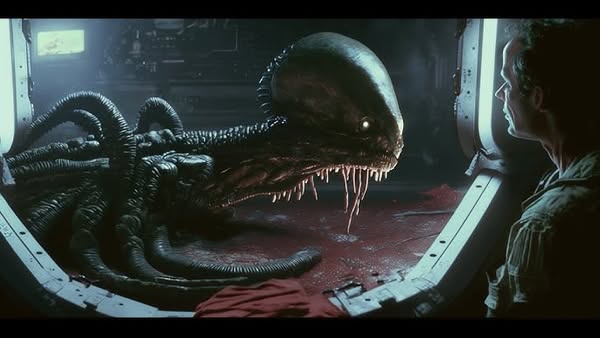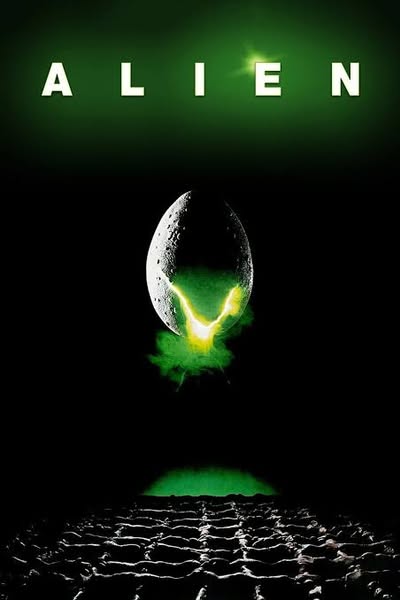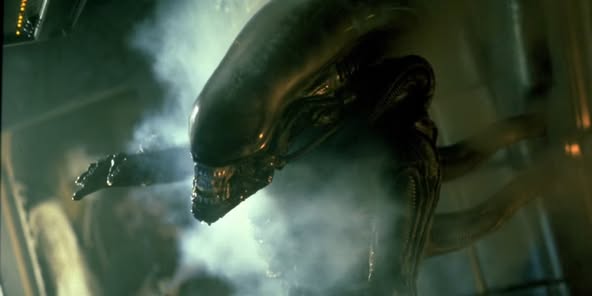Alien (1979)

Alien is a 1979 science fiction horror film directed by Ridley Scott that has become a cornerstone of both the sci-fi and horror genres. The film introduces audiences to the crew of the commercial spaceship Nostromo, who unwittingly encounter a terrifying extraterrestrial life form. With a stellar cast including Sigourney Weaver as Ripley, Tom Skerritt as Captain Dallas, and John Hurt as Kane, Alien masterfully blends suspense, horror, and groundbreaking visuals, creating an immersive cinematic experience that has left a lasting impact on film history.

The plot begins as the Nostromo is on a routine mission returning to Earth with a cargo of mineral ore. The crew receives a distress signal from a nearby planet, prompting them to investigate. Upon landing, they discover a derelict alien spacecraft and a chamber filled with mysterious eggs. When one of the eggs hatches, it releases a creature that attaches itself to Kane’s face, leading to a series of horrifying events. The creature eventually detaches and grows into a deadly alien life form, which begins to hunt the crew members one by one.
Scott’s direction is characterized by a meticulous attention to detail and a strong emphasis on atmosphere. The film masterfully builds tension through a slow and deliberate pace, allowing viewers to become fully immersed in the haunting environment of the Nostromo. The dark, claustrophobic ship serves as a perfect setting for the unfolding horror, creating a sense of isolation and dread. The cinematography by Derek Vanlint is striking, utilizing shadows and dim lighting to heighten the film’s suspenseful tone.

One of the most significant aspects of Alien is its groundbreaking production design, created by the legendary H.R. Giger. The design of the alien creature, as well as the otherworldly environments, is both grotesque and mesmerizing, setting a new standard for visual effects in cinema. The iconic alien itself, with its elongated head, sleek body, and terrifyingly effective life cycle, has become a symbol of horror and is recognized as one of the most memorable creatures in film history.
Sigourney Weaver’s portrayal of Ellen Ripley marks a significant moment in cinematic history, as she emerged as a strong, complex female protagonist in a genre often dominated by male characters. Ripley’s resourcefulness and determination set her apart, and her character has since become an enduring symbol of empowerment in science fiction. The dynamic among the crew members adds depth to the story, presenting varied responses to fear and survival in the face of an unknown threat.

The film’s score, composed by Jerry Goldsmith, complements the visual elements with eerie, atmospheric music that enhances the sense of dread. The sound design plays a crucial role in building tension, with the alien’s unsettling movements and the ship’s mechanical sounds contributing to the overall feeling of anxiety.
Alien not only delivers chilling moments of horror but also raises philosophical questions about humanity’s place in the universe and the nature of fear. The themes of isolation, survival, and the unknown resonate deeply, making the film more than just a horror story; it is a thought-provoking examination of human vulnerability in the face of extraterrestrial threats.
Upon its release, Alien received critical acclaim and was a commercial success, paving the way for a series of sequels and establishing a lasting legacy. Its influence can be seen in numerous films and media across genres, solidifying its status as a classic that continues to captivate audiences.
In conclusion, Alien is a masterfully crafted film that combines horror, science fiction, and psychological tension to create a gripping narrative. Ridley Scott’s direction, combined with stunning visuals and a standout performance by Sigourney Weaver, establishes Alien as a landmark in cinematic history. Its exploration of fear, survival, and the unknown ensures that it remains a powerful and relevant work, resonating with viewers for generations. The film not only entertains but also challenges audiences to confront the primal fears that lie within us all, making it a timeless classic in the realm of cinema.











